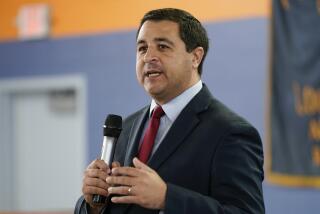Transcript Seal Urged in Case of O.C. Legislator
- Share via
SACRAMENTO — A lawyer for Assemblyman John R. Lewis (R-Orange) said Monday that he will seek to keep secret the grand jury testimony that prompted Lewis’ indictment on charges of forging former President Ronald Reagan’s signature on campaign letters.
Lewis’ lawyer, Clyde M. Blackmon of Sacramento, said the transcripts, if made public, would jeopardize Lewis’ right to a fair trial.
Blackmon’s comments came after Sacramento Superior Court Judge Rothwell Mason delayed Lewis’ arraignment until next Tuesday and agreed to keep the grand jury transcripts sealed until a hearing on the matter the same day.
Indicted Feb. 6
Lewis was indicted Feb. 6 on one count of forgery for his role in mailing thousands of campaign letters in 1986 that bore the phony signature of then-President Reagan. After the letters were mailed on behalf of six Republican candidates, the White House denied that the endorsements were authorized by Reagan or any of his aides.
Atty. Gen. John K. Van de Kamp initially investigated the case and turned over his findings to Sacramento County Dist. Atty. John Dougherty, who declined to prosecute. Van de Kamp then presented the case to the Sacramento County Grand Jury, which indicted Lewis.
The grand jury heard testimony from nine people, including several political consultants, direct mail specialists and staff members of the Assembly Republicans Political Action Committee, which coordinates GOP campaigns.
The testimony is expected to be politically explosive because Dougherty said the evidence showed that Lewis and former Assembly Republican Leader Patrick Nolan of Glendale told their staffs to lie to White House officials about how this happened. Dougherty also said that Lewis authorized the letters even though he knew that they had not been approved by the White House.
Lewis has denied any wrongdoing in the incident and called the charges politically motivated. Assembly Republicans said the entire episode was the result of a misunderstanding between the Assembly GOP staff and the White House.
Blackmon said he was seeking to seal the grand jury transcript, which is several hundred pages long, in order to keep a lid on adverse publicity that could make it more difficult to defend Lewis in court.
“My primary concern is to protect his right to a fair trial and not have this thing bandied about in the press,” Blackmon said.
State law calls for the transcripts to be made public 10 days after they are received by the defense attorneys unless they are sealed by court order. Under that schedule, the documents would be released next Monday.
But Judge Mason agreed to extend the deadline until next Tuesday so that the matter could be considered at the same time as Lewis’ arraignment.
W. Scott Thorpe, supervising deputy attorney general, said his office will oppose keeping the transcripts secret.
“The public has a right to know what’s in the transcript,” Thorpe said.
If the transcripts do remain sealed, Blackmon said, he will probably not seek a preliminary hearing for Lewis, at which prosecutors would be required to show probable cause that Lewis committed the crime. A preliminary hearing would be, in effect, a public version of what the grand jury heard in private.
“It would not make a lot of sense if the court seals it and then we turn around and ask for a preliminary examination,” Blackmon said. “That would be going at cross-purposes.”
Lewis attended Monday’s brief proceedings and sat next to his fiancee in the audience as the judge accepted guilty pleas from several defendants accused in burglaries and drug-related crimes. Gazing at about a dozen reporters and several television cameras on hand to record the routine hearing, Lewis joked that no one from the press would be free to cover Monday morning’s session of the Assembly.
After about half a dozen cases were dispatched, Lewis stood briefly in front of the judge and waived his right to be arraigned within 15 days after his indictment.
Times staff writer Mark Gladstone contributed to this article.
More to Read
Get the L.A. Times Politics newsletter
Deeply reported insights into legislation, politics and policy from Sacramento, Washington and beyond. In your inbox twice per week.
You may occasionally receive promotional content from the Los Angeles Times.










